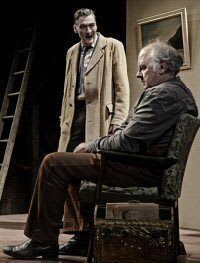Sam Thompsons Over The Bridge, when it was first presented 50 years ago in Belfasts since demolished Empire Theatre, broke the misama of deference to Ulsters then ruling Unionist partys cabal of retired colonels, majors, captains and minor squirearchies.
For Thompson, whod been a painter in the citys shipyards, having been encouraged by another figure on the literary left, Sam Hanna Bell of BBC Northern Ireland, had written a play which both exposed and detailed the sectarianism which was then part of everyday working life in the Harland and Wolff yards which had produced the Titanic.
But the Board of the publicly funded Group Theatre, whose members included the BBCs local Head of Programmes Harry McMullan, had turned down the drama, declaring that they were determined not to mount a play which would give rise to sectarianism or political controversy of an extreme nature.
As so frequently occurs, the old squires had isolated themselves from the public mood, so when the Groups Artistic Director, James Ellis, who would later to achieve a wider acclaim as Sergeant Lynch in the gritty Merseyside cop-shopper Z Cars, resigned in protest and set up a new company, Ulster Bridge Productions, he took the play - and most of his company - with him to pack the much larger Empire for week upon week before transferring to Dublin and London.
Though these proceedings occurred half a century ago, they are written into Belfasts broader consciousness and Thompsons - and Ellis - breaking of the status quo first hinted at by a previous shipyard dramatist Thomas Carnduff, paved the way for the next generations of Belfast playwrights, the Graham Reids, Stewart Parkers, Owen McCaffertys, Gary Mitchells and Martin Lynches.
Indeed it is Lynch, whose robust humour and unassailable egalitarianism most echoes Thompsons, who has grasped the difficult nettle and, with the imprimatur of the late Sams literary executor Brian Garrett, has been bold enough to tinker with the original and to present it under Rachel ORiordans fluidly choreographed direction in the publicly funded Waterfront Studio with financial support from a raft of trade unions.
So how did this half-a-century old enfant terible of a text fare on a weekend when Unites battle with British Airways had taken over the airways?
ORiordan has abandoned the proscenium for the round and thus this Green Shoot Production begins convincingly amongst a flurry of working men midst ropes, gantries and the hum of industry. But quickly it seems that Lynch has not been active enough with his blue pencil and the first 20 minutes are in danger of being little more than an old fashioned exposition of whos to do what and to whom.
And it is a preamble which is made more leaden by a totally misjudged performance by the usually accomplished Frankie McCafferty who plays, in a rush of words, the comically blinkered Rabbie, the trade unionist whose union rule book rules the waves to brutally horrific results. Towards the plays climax, another performance, that of a lightweight Alan McKees as the Mob Leader, also almost devalues the plays tensions while Matthew McElhinneys Buddy Holly moments are updates as unwise as they are superfluous.
That said, Thompsons denunciation of sectarianism is as powerfully valid as ever and a riveting performance by Walter McMonagle as Davy Mitchell, the decent doomed shop steward, plus Lalor Roddy truly magnetic as his would-be upwardly mobile brother George, along with Tony Flynn as the foreman and Billy Carter as Peter, the sole Catholic, made this, pertinently on the waterfront, a night to remember.
Londons Tricycle Theatre, currently running with Lynchs diverting Chronicles of Long Kesh, must surely be waiting in the wings?
Till April 3rd
